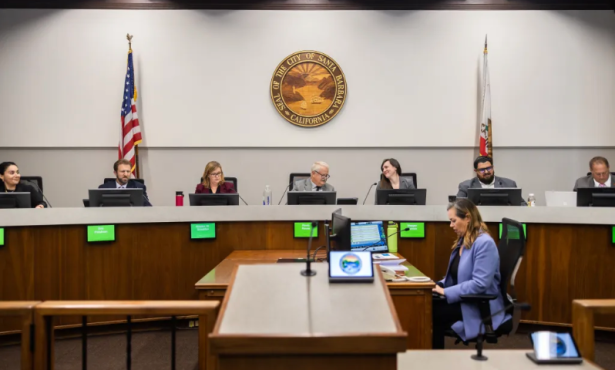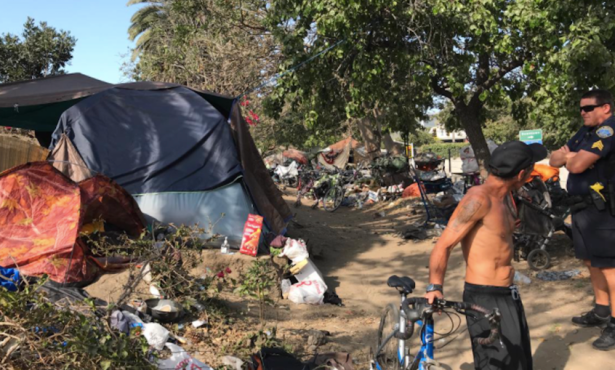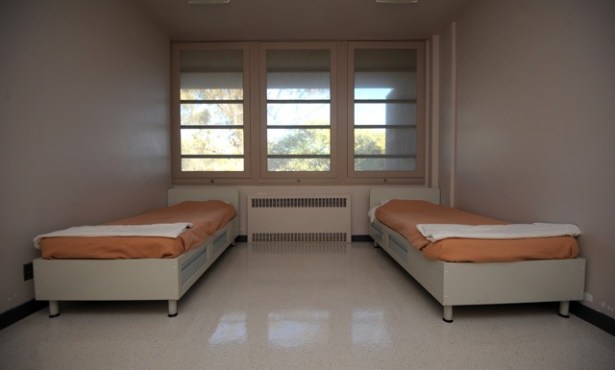Chile Getting Back on Feet
Photographer Finds Greater Damage Outside Capital City
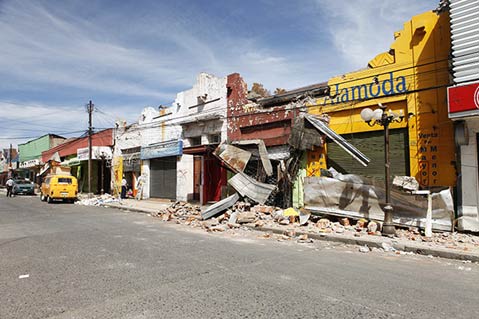
It is Friday, March 5, day six since the earthquake in Chile and I am still in Santiago, on the 19th floor of my hotel, shaking around from the aftershocks.
The situation in Santiago has stabilized. Besides traffic issues caused by collapsed or damaged highway bridges, life seems to be back to normal, to the eye of someone who just arrived here that is. People are still afraid of the continuing aftershocks and their eyes open wide during discussions about the events of the morning last week when the 8.8 magnitude earthquake struck.
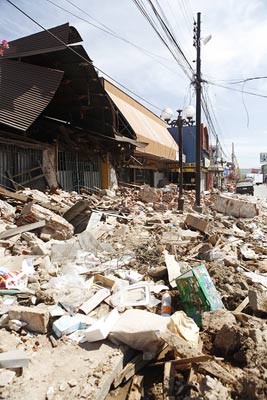
I have been spending most of my time in Santiago, waiting for the airport to open back up so American Airlines can send a jet down here. Three days ago I called American Airlines and the lady I spoke to informed me that she didn’t see any irregularities concerning Santiago on her screen: Well informed! As far as we can tell from that source, the airport is now, on Friday, open and we are scheduled to fly out tonight.
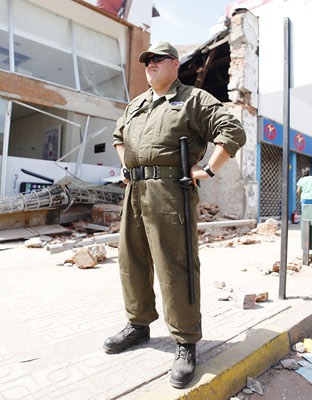
Yesterday we rented a car and drove south toward Talca, close to the earthquake’s epicenter. We were warned that the main highway, Route 5, was damaged in many spots and the drive could take very long. Tired of being shaken around in the hotel, we disregarded the warnings and headed south. After initial issues with our GPS, which sent us into downtown Santiago on a nice little detour, we were making good headway until about 20 kilometers north of Rancagua: The highway was closed and we had to detour via a country road. But next to the bridge that had caused the highway’s closure, the road too had completely collapsed: It had cracked, and dropped six feet. A little further down the country road we reached another bridge crossing a highway. This bridge had completely collapsed as well, and the road leading up to it had shifted, cracked, and dropped. It was a sight of complete destruction.
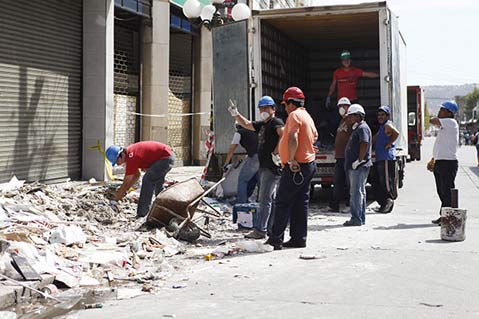
Plagued by multiple delays due to traffic, especially where a bridge over a large canyon was completely destroyed, we made it to Talca. The moment we got into the town we spotted houses that had been completely destroyed. A lot of the structures here were built with walls made of mud, and they did not withstand the forces of the earthquake. Streets looked like scenes out of a war zone. Rubble and piles of building materials were lining the roadsides. Whole neighborhoods were destroyed. People were cleaning up or sitting on the streets. We spotted multiple people retrieving their belongings from houses that looked like they were going to collapse any second. The cleanup seemed to be underway though, and overall people were composed and did what they could to go forward. Our rental car added to the stress and the sense of destruction that that overcame us—it only started one out of eight times I turned the key. Considering our location and circumstance, we decided, for peace of mind, to not be bothered with it.
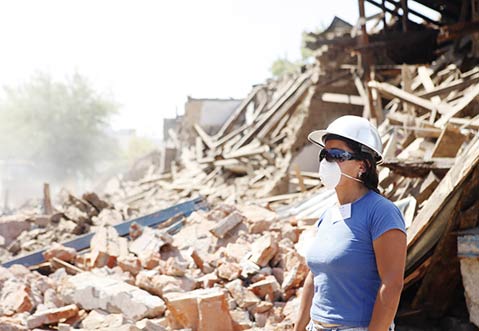
When we reached downtown Talca the scene did not change much. The commercial area was pretty much wiped out. We hardly saw any buildings that weren’t destroyed to the degree that they would have to be torn down and rebuilt. While we took photos on a street corner, a man came over to us and pointed at the display of his digital camera. It showed a photo he had taken of a dead man. Again the scenario reminded me of images of bombed cities in a war zone. Power lines were hanging low over the streets, with the posts that usually hold the lines up now themselves dangling from the cable or propped up by the trash and rubble that was everywhere.
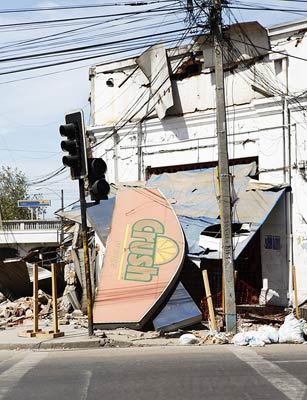
A group of locals was going through a pile of trash on the side of the road. To applause from all the other members of the group, one man surfaced with a pair of glasses and put them on, smiling wide. On a large property with fallen walls, a Chilean flag was stuck in the ground—surrounded by destruction but claiming a unified will to go forward. Cleanup was proceeding and the streets were filled with three types of people: the ones that cleaned up rubble, spectators of all kinds, and law enforcement. I took a photo of a very serious policeman. When I approached him he asked me my name, occupation, and location of residence. It sounded like he wanted to arrest me on the spot. But I am sure he had to deal with a lot of chaos in the past days and just needed to establish his authority.
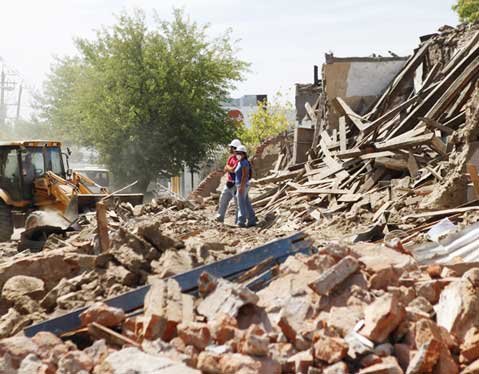
Not far from the city’s center, an industrial area also had been damaged by the earthquake. Due to the nature of the structures, damage was less than in the commercial zone, but large silos had fallen over and buildings were cracked and looked tweaked.
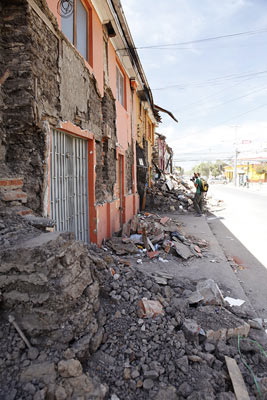
We had seen enough and felt a strong urge to get away from the hot, dusty, busy disaster area. We decided to drive into the Andes and see what we would encounter. After driving up a dirt road for a good 30 minutes, we reached a little refuge by the name of Vilches on the border of a nature preserve and hiking area. The air was crisp due to the high elevation, and the smell of pine replaced the strong odor of trash, dust, and fecal matter. Cowboys were riding on horses and kids were playing by the side of the road; the contrast of scenery couldn’t have been stronger. We sat down at a place that couldn’t really be considered a restaurant—it was a couple of shed-like structures—but which offered drinks. The owner sat with us and we had a 30-minute conversation in Spanish, German, and English in which 90 percent of the words were not understood but the ideas came across. They had been without electricity since the earthquake and their structures had collapsed. I doubt that he had any idea how badly destroyed the areas in the valley below him were.
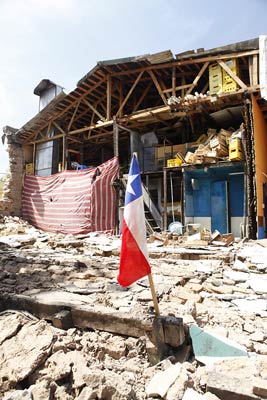
I will, I hope, be leaving here today. My nerves are close to capitulating with the inconsistency of American Airlines in dealing with the situation; the continuing aftershocks which send me to the floor in the middle of the night and bring back the horror of thinking I was going to die during the quake; rental car agencies trying to suck every dime out of me; and overall exhaustion. I am ready to get out of here and am looking forward to loading our 12 cases of photo equipment on the plane leaving tonight.
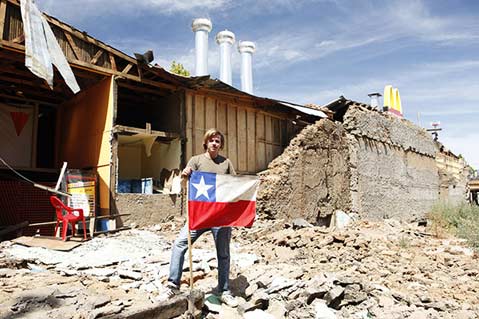
Photographer Jonas Jungblut, born and raised in Germany, has resided since 2001 in Santa Barbara, where he lives with his wife and seven-month-old son. More images from his time in Santiago can be viewed on his blog at jonasjungblut.com/blog, and his portfolio is located at jonasjungblut.com.

